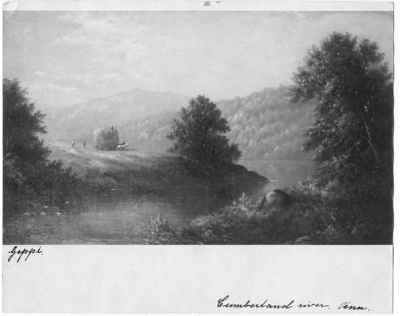
Hey Thanks, Original Nashvillians,
We don’t know what you called yourselves, so we had to assign you rather prosaic names — Paleoindians, Archaic Indians, Mississippians, Mound Builders — as we tried to wrap European tongues around American syllables for the first time. These names lack the romance of those we ultimately assigned your posterity — Chickasaw, Shawnee and the rest.
We never had a chance to presumptuously assign you a name because you disappeared before we got here. Some of you, maybe, saw the sunshine glint off Hernando de Soto’s helmet as the first men who sailed west across the Atlantic crossed your country, but by all accounts, we never got to meet.
Even so, you left us a legacy: ceremonial mounds and burial sites where we’ve found your sacred art and the carefully crafted stone boxes in which you buried your honored dead. We found your middens — piles of the detritus of everyday life you probably never gave a second thought to, but give our scientists tantalizing glimpses into the way you lived.
We’ve even found villages. One, south of Nashville, we called “Kellytown” for ages. We’re calling it Aaittafama’ now, a word we learned from the Chickasaws. It means “a place to gather together.”
In these places, we sometimes find things that seemingly don’t belong in the lush but landlocked country you called home long before us. Seashells, for example, that had to come from 500 miles away. Thus we know you were part of something larger, a culture that sent its branches stretching out all over creation. We all too often think of the people who got here before us as nomads crisscrossing the country with villages that were, at best, evanescent. Sometimes that was true, but oftentimes it was an exaggeration to justify forcing your descendants out. There’s no argument you preferred permanence.
Your towns and villages had hundreds and thousands of people. What was one of your biggest cities, Cahokia — it sits across the river from a place now called St. Louis, and our deepest apologies for that charmless hulk — may have had 40,000 people in the 13th century, the same size as London at the time. It was the largest city in what would become our country, until Philadelphia crossed the threshold almost 600 years later.
But you left us something more than just the bits and bobs of your extraordinary culture. You left us an example.
At some point, you left where you were and came here. You followed the animals who knew about this place and its thick grasses and salt licks and its clear-running river, and when you got here, you knew the buffalo were on to something. So you stayed.
You were looking for something better for your children, and you found it on the banks of what we call the Cumberland (your Shawnee heirs called it “Warioto”). You made a life here — a successful life, judging by what we’ve found — in what was then truly wild and unsettled country.
You disappeared — our scientists are still trying to figure out how that happened, by the way, how a culture of so many hundreds of thousands of people just vanished or dissipated. History still has secrets it won’t give up. But for a millennium, people have followed your lead. Those Shawnees and Chickasaws and the rest did it. Some men named Demonbreun and Donelson and Robertson did. And then a lot more did.
People still come here looking for something better for themselves and their families, just as you did, and most of the time we rarely spare a thought for the pioneers who took those steps first.
You inspire us, even if we don’t always realize it. For hundreds of years, people have moved here and said, “This is the place,” but it was your place first.
Thank you for finding it.
—J.R. Lind
Staff writer, Nashville Scene





